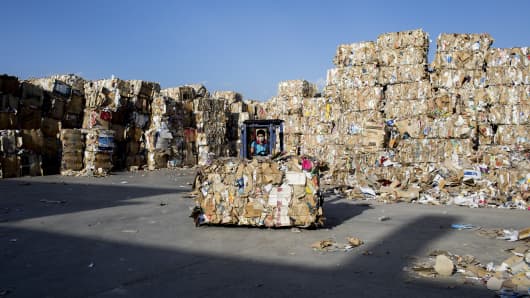AssassinsMace
Lieutenant General
The graveyard of Western predictions of China's economy collapsing. I copied and pasted a translation of this from on FYJS. I don't know if it's correct but it sounds about right.
1990. The Economist
China's economy will be stagnant.1990. The Economist China's economy will come to a halt.
1996. The Economist China's economy will face a hard landing
.
1998. The Economist
China's economy is entering a stagflation period
1999. Bank of Canada: The Likelihood of a hard landing for the Chinese economy
1999. Bank of Canada : China's economy may be hard landing.
2000. Chicago Tribune: China
's currency policyhits the hard landing risk
2001. Wilbanks Smith & Thomas: A hard landing in China.
2001. WST Asset Management: China is
Hardlanding2002. Westchester University: China Anxiously Seeks a Soft Economic Landing
2002.
The New York Times: Banking crisis imperils China
2003. The New York Times: The Bank Crisis puts China into danger
2004. The Economist: The great fall of China?
2004. "The Economist: China falls
2005. Nouriel Roubini: The risk of a Hard Landing in China
2005. Nouriel Roubini: China's hard landing hazard
2006. International Economy: Can China
achieve a soft landing?
2007. TIME: Is China
's economy overheating? Can China's economy overheat?Can China take a hard landing?
2008. Forbes: Hard Landing In China?
2008. Forbes: China's hard landing?
2009. Fortune: China & s hard landing. China must find a way to recover.
Fortune Magazine: China's hard landing.China must find a way to recover.
2010: Nouriel Roubini: Hard landing coming in China.
2010 Nouriel Roubini:
Hardlanding is near China2011: Business Insider: A Chinese Hard Landing May Be Closer Than You Think
2011: Business Neids: China's hard landing may be closer than you think
2012: American Interest: Dismal Economic News From China: A Hard Landing
2012: US interest: China's bad economic news: a hard landing
2013: Zero Hedge: A Hard Landing In China
2013: zero hedge: China's a hard landing
2014. CNBC: A hard landing in China.
2014. CNBC: China's hard landing
2015. Forbes: Congratulations You Got Yourself A Chinese Hard Landing.
2015. Forbes: Congratulations, you have come to a Chinese hard landing
2016. The Economist: Hard landing looms for China
2016. " Economist ": hard landing in China looming
2017. National
interest: China's economy will collapse?
1990. The Economist
China's economy will be stagnant.1990. The Economist China's economy will come to a halt.
1996. The Economist China's economy will face a hard landing
.
1998. The Economist
China's economy is entering a stagflation period
1999. Bank of Canada: The Likelihood of a hard landing for the Chinese economy
1999. Bank of Canada : China's economy may be hard landing.
2000. Chicago Tribune: China
's currency policyhits the hard landing risk
2001. Wilbanks Smith & Thomas: A hard landing in China.
2001. WST Asset Management: China is
Hardlanding2002. Westchester University: China Anxiously Seeks a Soft Economic Landing
2002.
The New York Times: Banking crisis imperils China
2003. The New York Times: The Bank Crisis puts China into danger
2004. The Economist: The great fall of China?
2004. "The Economist: China falls
2005. Nouriel Roubini: The risk of a Hard Landing in China
2005. Nouriel Roubini: China's hard landing hazard
2006. International Economy: Can China
achieve a soft landing?
2007. TIME: Is China
's economy overheating? Can China's economy overheat?Can China take a hard landing?
2008. Forbes: Hard Landing In China?
2008. Forbes: China's hard landing?
2009. Fortune: China & s hard landing. China must find a way to recover.
Fortune Magazine: China's hard landing.China must find a way to recover.
2010: Nouriel Roubini: Hard landing coming in China.
2010 Nouriel Roubini:
Hardlanding is near China2011: Business Insider: A Chinese Hard Landing May Be Closer Than You Think
2011: Business Neids: China's hard landing may be closer than you think
2012: American Interest: Dismal Economic News From China: A Hard Landing
2012: US interest: China's bad economic news: a hard landing
2013: Zero Hedge: A Hard Landing In China
2013: zero hedge: China's a hard landing
2014. CNBC: A hard landing in China.
2014. CNBC: China's hard landing
2015. Forbes: Congratulations You Got Yourself A Chinese Hard Landing.
2015. Forbes: Congratulations, you have come to a Chinese hard landing
2016. The Economist: Hard landing looms for China
2016. " Economist ": hard landing in China looming
2017. National
interest: China's economy will collapse?

